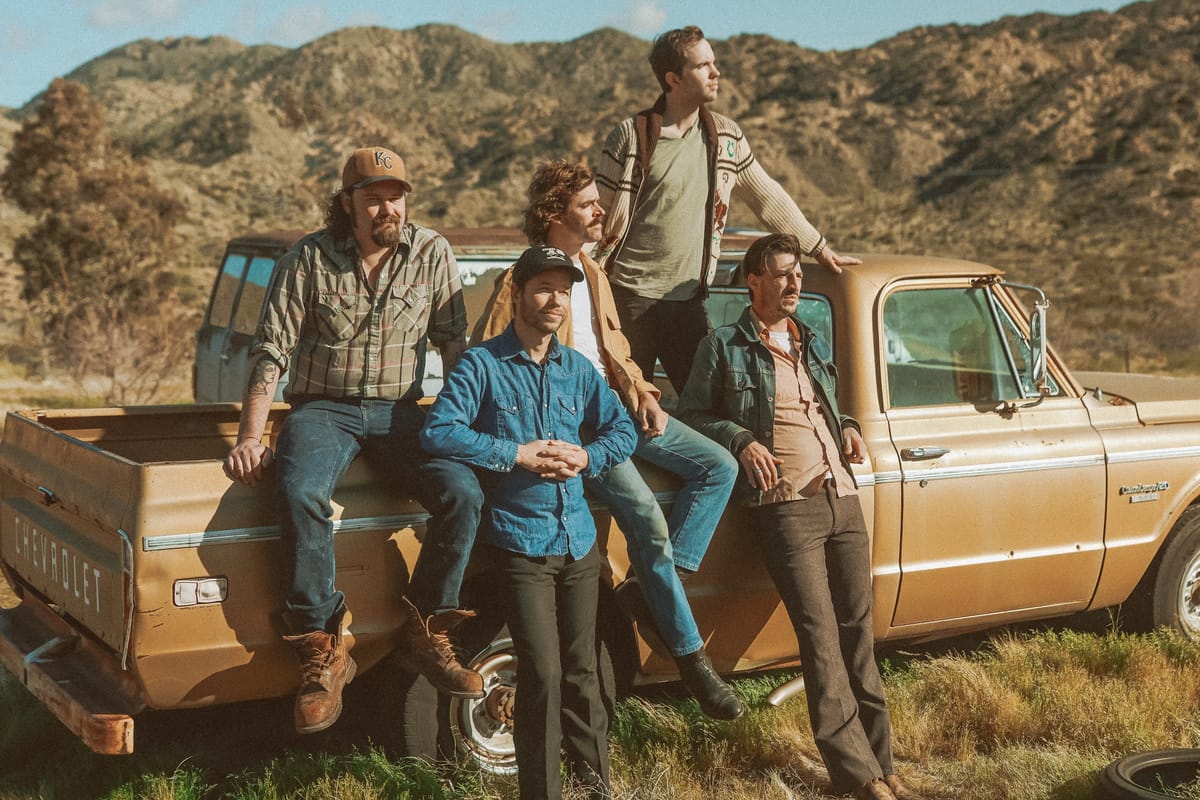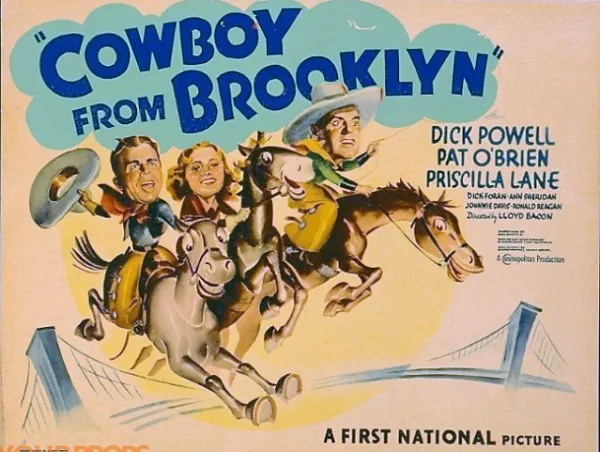Issue #108: Meet The Best Country Band You're Not Listening To: The Deslondes

At first listen, what the Deslondes do sounds simple. There are layers of familiar-ish hooks, riffs, grooves and harmonies heard through a swampy, analog haze. The vibe — easy, often danceable and unforced but full of dozens of little earworms — hits you before the lyrics, which tend towards a particularly Millennial blend of earnestness, resignation and humor. There's the slow-rolling Western feel of "South Dakota Wild One," the hoedown oom-pah of "Those Were (Could've Been) The Days," the romantic, pared down crooning of "Beautiful Friend," and the lightly psychedelic "I'll Do It," to name a few — is it "country soul," "Americana," R&B, country, folk or something else entirely? Whatever term you use, the New Orleans band's particular slow-burning alchemy has earned them a cult following that persists a decade after the release of their self-titled debut, over fifteen years since they started playing together.
"People have as hard a time figuring out [our genre] as they do saying our name," says Riley Downing, one of the five Deslondes (That's Dez-lawndes, for the uninitiated). "I just tell people it's an all-genre singer-songwriter band where we all take turns and have four-part harmonies." He's standing outside in the one spot he gets reception in rural Missouri, where he's originally from and where he's waiting for it to rain so he can go mushroom hunting. "It's like a safe space for harmony nerds," says drummer Howe Pearson, the newest Deslonde. "We can all unabashedly love The Beatles. Not necessarily the coolest thing, but…"
The way they synthesize a bevy of old-school sounds into something fluid, fresh and, frankly, blood-pressure soothing (for this writer at least) feels unusually egoless — there is no shredding, no intense navel-gazing, no overwhelming focus on one bandmember's contributions. They all write songs, almost all sing them, and trade instruments regularly. Downing and Sam Doores are slightly more likely to bear composition and lead-singer responsibilities, but are always ready to cede the spotlight.
"It's not like there's one frontperson," says John James Tourville, the band's Swiss Army knife on guitar, fiddle and pedal steel (he's the only one who doesn't sing). "We're all just kind of hanging out up there. I feel like everyone is crucial to what our band is — not saying that it's not like that for other bands, but with us everyone trades songs and tells stories and just talks shit, you know?" In case I thought all those years as a band had made the grind a little more glamorous, Tourville is calling from under the hood of his van which he is trying to start with a chainsaw file (I hear the roar of the engine shortly after to corroborate his story). It's just one pit stop on the band's long and winding road, which has led them both all around the country and still not all that far from the musical and physical place where it all began.
Pinpointing exactly where and how the Deslondes started requires tracing a number of chance meetings around campfires, street corners and random jams. The instigator in most accounts is Sam Doores, who grew up in the Bay singing in Black Baptist gospel choirs with his mom and sister ("They made an exception for us," he quips) and playing drums in middle school and high school jazz band. A Bob Dylan phase in his late teens led to a sea change in his musical life: "I ended up just becoming completely obsessed with being a Guthrie wannabe," says Doores. He started hitchhiking, and wound up in New Orleans. "When I was 19, I got a gig here at an Irish pub and a free place to stay — I was playing four hours a night, seven nights a week, underage in the bars," says Doores. "It's just hard to beat that level of excitement for a teenager."
A couple trimesters at Evergreen State College in Washington did not compare, and Doores convinced his friends — including Cameron Snyder, the Deslondes' original drummer — to stop at the Woody Guthrie Folk Festival in Okemah, Oklahoma en route to relocating to New Orleans permanently. There, he met Riley Downing, who was at the festival in a band called Tamper Dan and the Dirt Merchants. "We just hung around the fire a bunch and traded songs," said Doores. "I remember Riley had this one song his buddy had written that was like, 'I ain't a hippie but I give a tree a hug.' I was like, 'Ooh, I like this.'" He kept in touch with Downing, and the pair reconvened at WoodyFests the next couple years.
"None of us had met anyone else that was obsessed with Cast King or Abner Jay or weird Mississippi Records comps and also obsessed with Woody Guthrie," says Doores. "We wanted to make something that was carrying on the tradition, and had something to say about the world."
In New Orleans, Doores met Dan Cutler, who would become the Deslondes' bassist. Cutler grew up in Detroit, studied audio engineering at Berklee and moved to New Orleans not long after Katrina, working as a PA on the NPR show American Roots and playing around town. He met Sam there around 2007. "[Doores] was one of the guys I'd see around town and wonder, how are they managing?" Cutler says. "A lot of people knew Sam because he was this sort of freewheeling guy. He looked and sounded a lot more like Bob Dylan back then, but it was kind of cute. He was very personable and everybody that knew him liked him."
They started collaborating a couple years later. "Sam was one of the few people in town at the time that was also into more country-folk stuff, so we hit it off pretty quickly," Cutler remembers. "He really wanted to put a country band together, which was not something that people were really doing back then, but both me and him were really into the idea of it."
Doores had been inspired in part by visits to Austin and seeing the honky-tonk culture there. "I thought it'd be really fun to put together an electric honky-tonk dance band that also combined aspects of New Orleans R&B and swamp pop and stuff," he says. It was also around then that Doores moved into the house on Deslonde Street that would eventually serve as inspiration for the band's name, as well as the home of countless early hangs and jams. "It's right where the river bends in the Lower Ninth Ward, and it's surrounded by a bunch of open space," says Doores. "We would just go smoke weed and watch the sunsets and trade new songs."
Another early connection for Doores in New Orleans was Alynda Segarra, better known as Hurray for the Riff Raff, who he started dating not long after he got to the city (They were together for six years.). He and Cutler started serving as their backing band and playing together as the Tumbleweeds around the same time, tying the two projects together. Together, they started a weekly country night, kind of an open mic with two-stepping lessons hosted by Hurray for the Riff Raff and the Tumbleweeds.
As both bands got more serious — and after a few years of memorable WoodyFest reunions — Doores called up Downing and asked him to move to New Orleans and join the Tumbleweeds. "I was 22 years old, and I was an up and coming trash man — I actually was about to start taking it serious," says Downing, who was living in the small Missouri town where he grew up. "But I was 22 and going to New Orleans to join a band sounded a lot more fun. I think they thought I knew more about music than I did — I definitely learned how to harmonize."
Segarra got more and more gigs, and so they'd open their shows as the Tumbleweeds before backing Hurray for the Riff Raff as headliners which made those early tours fairly seamless. "We went from unknowns to being able to play shows all over the country," says Cutler. "It was not glamorous, we didn't make much money, but it was great."
In the years since, a number of artists who have spent time in New Orleans — Charley Crockett, Sierra Ferrell and Nick Shoulders as well as Riff Raff and the Deslondes — have seen their stars rise. "Everyone was just really into each other's work and supportive of it in a way that had nothing to do with the music industry or anything like that," said Doores. "It was just kind of no man's land, and a good place to busk all day and play with a bunch of different types of people."
"I feel like the thing these New Orleans groups have in common is that everybody's sort of loose but tight, in a way," says Cutler. "It's really easy to figure out what the crowd responds to when you're playing like on the street, and it's just lovely how organic it all feels. It's a very social, happy place for music."
"You're around so many different styles and genres of music in New Orleans, you just kind of soak it all up and start hearing things a different way," says Downing. "Even some of those old Ernie K-Doe songs, on an acoustic guitar, they play like a country song."
The city also led them to the fourth Deslonde, Tourville, who grew up in St. Paul and, in his words "didn't go to high school." He heard about a job working on barges at the other end of the Mississippi River, in New Orleans, and hitchhiked there "in January, which was fucking stupid." Tourville fell in love with the city — "met all of my friends who became my family," as he puts it — and met Downing early on, too. "The first day we met, we were like, 'Man, we're going to be friends for the rest of our lives,'" Tourville says.
He joined the band a few years later, after picking up fiddle and steel guitar to supplement his existing guitar skills while on the road with Pat Reedy. In the tradition of the band's kismet, when they flew him out to Nashville to officially join the band on the road, the Hurray for the Riff Raff tour manager picked him up at the airport; her name is Linda, and the couple, now married with two children, has been together ever since. The chemistry with the band was nearly as instant. "There was something about it," Tourville says. "It was just so fun."
By that point, the Tumbleweeds had started to refine their sound. "We all had some severe musical limitations, so simplicity was working for us," Doores quips. "The kind of band I wanted to be in was one where everyone can sing, everybody can write, and everybody can arrange together. Just a full-on musical democracy." Upright bass, Tourville's combination of fiddle, pedal steel and guitar, Snyder's pared-down snare and kick drum kit, Downing's resonant low harmonies and a couple choice effects — "I had recently discovered the magic of the tremolo on a guitar and the Dearmond sound hole pickup that Lightning Hopkins used, so that was kind of my signature," says Doores — formed the core of the electric-acoustic countryish dance band.
That 2011 Nashville tour stop with Hurray for the Riff Raff proved formative in another way: Producer Andrija Tokic was running sound for their gig at the Five Spot. Before the doors opened, Tokic, who now runs the Bomb Shelter studio, was playing demos for the still unreleased Alabama Shakes debut album Boys & Girls, which he produced, over the venue's sound system. Doores was instantly hooked, and asked Tokic who it was. "This is a band I'm recording right now," was his reply. "Well, this sounds amazing, and I want to make an album that sounds like this," Doores said.
They also met another future collaborator and friend that night at the Five Spot. Margo Price, who was singing backup for a number of Tokic's sessions at that point and is now a fervent Deslondes advocate, was there and, as Tokic recalls, joined the band for a song. The rest was history, with both the band and Hurray for the Riff Raff heading to Tokic's home studio the next day and Tokic producing the vast majority of their work to this point. Not long after, the Shakes — still virtually anonymous — wound up opening for what was then still the Tumbleweeds. "It was really wild and also very humbling," says Cutler. "Even at that point, they had no business opening up for us."
Tokic was initially as charmed by the Tumbleweeds as they had been by his production work. "I had just never heard people dripping with that old juju, where it sounds like some real 1950s country," says Tokic. "Everybody was trying to do this super tight, clean, singer-songwriter thing, and I remember very much liking that it was vibey more than it was polished."
The band started coming to Nashville for extended sessions at Tokic's home studio, crashing on his floor while they worked out different songs with the assistance of the man they've called "the sixth Deslonde" ("I think they just say that so I don't get mad at them," Tokic says). "It'd be like a big old, exciting family gathering — there's very few bands where I'm literally like, 'Come on in,'" says Tokic. "Riley was having his train friends show up out of nowhere to live in my backyard. I'm like, 'Who are these guys?' There's homeless people with dogs back there." The off-the-cuff nature of their collaboration, though, came through in the effortless sound they captured. "Especially when you're tracking the tape, there's a lot of trying to keep the mood up because if people sound like they're having a good time you can feel that," says Tokic.
All that time on the road meant that both Hurray for the Riff Raff and the Tumbleweeds started getting more opportunities that conflicted with each other, making the previous chummy model unsustainable. They'd recorded a "very lo-fi" album as the Tumbleweeds, burning the CDs themselves and changing the tracklisting regularly. An offer to open for the Alabama Shakes in 2014 cemented the schism — and the name change from Tumbleweeds to Deslondes. A band in the Netherlands had owned the name the Tumbleweeds for years and "didn't want to share it," as Downing recalled.
Their 2015 self-titled debut, released on New West (which remains their label to this day), followed soon after, finally putting that by then well-honed sound in wide release. Several songs from it remain fixtures of their live sets — the aforementioned "Those Were (Could've Been)," "Fought the Blues and Won," the groovy, Twist-worthy "Real Deal," and of course, "Less Honkin' More Tonkin'," the effervescent, Cajun surf-rock blues that's inspired one of the band's most popular creations: a bumper sticker.
"'Less Honkin' More Tonkin'' definitely started out as a joke for us," says Doores. "We were driving from Boston to New York, and Riley had a little bit of classic New York road rage. He just yelled it out loud: "Less honkin', more tonkin'!" "I just didn't understand why everyone was honking when we were all going one mile an hour," says Downing. "It started to finally get to me." Downing went back to the Missouri shed where he says he does all his best songwriting, and turned it into a song — and bumper sticker.
The original was orange, "smaller than a pack of cigarettes," in Downing's words, and the exclamation points looked like boot marks. "I had no idea that was going to become a thing where everybody I know was going to have one of those," he says. There are endless bootlegs — "Somebody besides me is doing very well with less honkin', more tonkin'," as Downing puts it. [Make sure you're buying an official one if you want to join the ever-growing club!] He insists there's more where that came from. "I could think of a new bumper sticker every day if people wanted to print 'em for me," he says.
"I was dropping my kids off at school a couple months ago, and someone cut me off and I almost got in a car wreck — then they had a fake [Less Honkin' More Tonkin'] bumper sticker," says Tourville. The band had to send H&M a cease-and-desist letter because they were selling shirts that said "Less Honkin' More Tonkin'." "We're so stupid in so many ways," Tourville adds. "They were like, 'Well, why don't we just keep selling it and you'll get a cut?' And we're like, 'Hell, no, fuck you.' We should have just done that.'"
The band pushed for any share of buzz they could find, as their friends Hurray for the Riff Raff and Alabama Shakes found success far beyond New Orleans and Nashville. They stayed on the road, and released another rich collection of songs, Hurry Home, in 2017. The album includes "Beautiful Friend," one of the band's few true ballads. "The guys have experienced it a few times, I think, but one of the first shows I played with them, we played 'Beautiful Friend' and someone proposed during the song," says Pearson. Cutler, who wrote it, says that it was inspired by the Stanley Brothers hymn "Jordan." "I guess I was thinking of how to make up with my now-ex wife after pissing her off for one reason or the other," he says. "It might have come out a sentimental love song, but at the time, I wasn't thinking of it that way. It was more about my own lack of communication skills, trying to make it kind of funny."
Around that time, the band and specifically Doores sought to capture the sound of New Orleans "Americana" with a compilation called Mashed Potato Records Vol. I — a collection that included another one of the band's most beloved songs. "Run Wild" is a cover of a previously rare Jimmy Jay Starday 45 featuring vocals by Mat Davidson, also known as one of Doores' best friends from high school and the man behind Twain. "It points people to the original, which is such a great recording," says Doores. "But [Davidson] also completely took it to a new world." Downing had found it on a 45 (these days he's "90% reseller, 10% collector," though he occasionally DJs) and taught the song to Mat. "I ruined the song for myself because I can't even afford a copy anymore," says Downing. Now, the original has nearly 300,000 views on YouTube.
The band started to feel the effects of all those opening slots, though, which had gotten more grueling than exciting even as the names got bigger and bigger: Old Crow Medicine Show, The Lumineers, peak fame Alabama Shakes.
"You're on the road pretty much nonstop but you're still completely broke, paying rent on places that you aren't even living in, and just spending too much time in a van together," says Doores. "I think it was the Old Crow Medicine Show tour that really took it out of us. We doing epic 13-hour drives following their bus to play an opening set, and by the end we were, like, getting in fights over pizza orders and stuff."
"It felt like there was all this traction, but then nothing was really happening," Tourville adds. Cutler had just had his second child, and had to stay off the road for at least 6 months; Tourville also had two kids under five. "Touring so much and having babies and being gone was really hard," Tourville says. Family and burnout compelled the band to initially take a break in 2018, then Doores and Downing started thinking about their solo careers, and then the pandemic started; suddenly, their burnout break extended from months to years. "When people ask, 'How did you stay a band so long?' Well, you got to break up a few times," says Downing.
It was Tourville who spurred their reunion. "I had done so many sessions [as a producer and session musician] during that break away from the Deslondes, and I was like, 'Man, there's no reason why our band can't just be easy about it, instead of everything being so hard," he says. "So I reached out to everyone and said 'Let's do a fucking record. We all have so much potential that we haven't tapped into yet.' We made Ways and Means, and I feel like we all just started taking way more charge. There was a whole dynamic shift after the break, and with that record."
"We all just had time to reflect and grow up a little bit," says Doores.
With space and time, their sound also got more expansive and occasionally experimental: synths, horns and different effects no longer felt verboten. Ways & Means, released in 2022, showed that range with soaring sax solos and the kind of distortion that had previously been uncharacteristic. "In those early days, it felt like there was still something of a stigma against going too electric — we wanted to keep this fuzzy acoustic sound," Cutler says. "Now when we get together and record, we'll just do whatever we feel like is appropriate — there's a lot more full drum kits and electric bass and everything, we're mixing genres all the time."
"I think it's just maturing and wanting to try different stuff, and not wanting to be pigeon-holed into one corner of whatever Americana is," says Downing. "I grew up in the country, but I fucking hate wearing cowboy boots. Just didn't really want to fit the mold that maybe a lot of other people do or think they have to — a reminder to ourselves and to anybody listening that you don't have to."
Their drummer Cameron Snyder wound up quitting the band after their reunion because of the touring grind, but Howe Pearson, who had already been playing with Doores as well as Hurray for the Riff Raff, stepped in and "seamlessly became a Deslonde" in Tourville's words.
Pearson is originally from Westchester County, New York, and has been in New Orleans for about a decade — along with gigging, he's worked as an elementary school music teacher. He first saw the Deslondes not long after he moved to New Orleans, and was a fan before he was a member. "I loved the singing," he says. "I was really struck by how they passed around leading the songs. It's harder to find true bands these days for a variety of reasons, but I was just like, 'Wow, that's a band.'"
"There's all these different songwriters with different songwriting styles," says Doores, "but we've all influenced each other enough that it remains cohesive and plus we're all arranging it together, so it's going through the same kind of filter."
Post-hiatus, the Deslondes have racked up substantial streaming numbers and syncs on shows like Yellowstone. "I don't know what it is — the algorithm?" says Doores. "We took a long break as a band and came back and there were actually more people at our shows than there were before we took the break. I think just word of mouth and stuff has helped, plus some people are just getting into that style of music and then sharing it with each other."
They've now released an album with Pearson, 2024's Roll It Out, which adds his songwriting and singing into the mix along with his drumming. The Deslondes are still refining how to tour sustainably, but those long runs on the road and unforgiving opening slots are in the past. "Of course we would love to sell a lot more tickets and make a lot more money, but the most fun rooms to play are around 200 or 300 people," says Cutler. "I love when we're a bar band," says Pearson. "It's hard to keep touring as strictly a bar band, but we're trying to find the middle ground."
"It's so hard to say if it actually is sustainable, but I'm not gonna do anything else," says Tourville. "This is what I'm going to be doing the rest of my life. I've been broke my whole life, it's not new."
Everyone in the band agrees that they're more content and productive than they've ever been right now. "It feels like there's more of a vision, like we're just getting into our stride," says Tourville. They just recorded a collection of covers in New Orleans, some old rarities like "Run Wild" and some songs by their music making friends, on Doores' 8-track reel-to-reel recorder that they're hoping to release later this or next year.
Cutler, Doores, Downing and Pearson still live in New Orleans, and Tourville is in Asheville. "We all have sort of lived separate lives at this point, but we're still all kind of just there in the background of each other's lives — seemingly forever," says Cutler. The success may not be explosive, but the audience is there — small rooms full of people who want to dance and sing along to the songs they've had in their head for weeks (or maybe that's just me). The music, understated and seemingly straightforward as it is, will have you ready to scream "I want an Abba Zabba and a Mr. Pibb" in waltz time, relax on a porch or two-step the night away (depending on the song). That's the Deslondes' promise — to share some of the camaraderie they do onstage and in the studio with their listeners.
"We've just known each other so long and done everything that five dudes could do together," says Downing. "I wouldn't have it any other way. I wouldn't even know where to go to try to do this all over again, and I think we're having more fun than we ever have."





